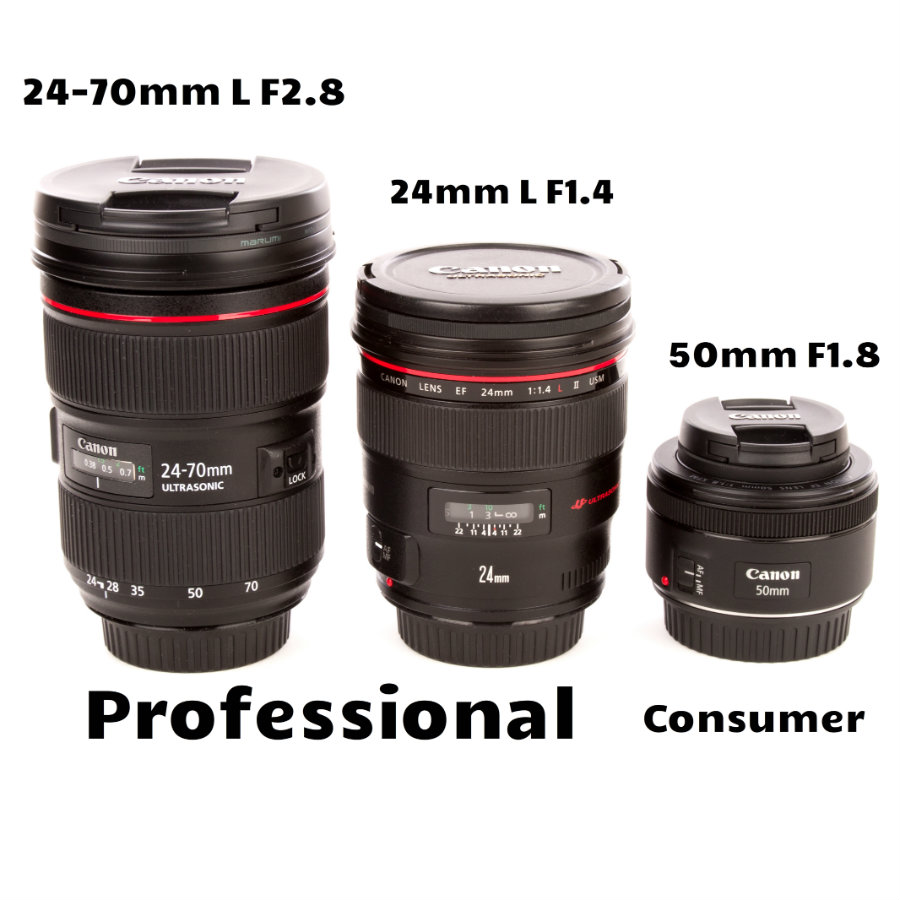
Some of David's Lenses - Shot by Assistant John
Let me start out by saying what I say on a regular basis in case you haven't heard it from me before. "Any photographer should do the best they can with what they can afford." Furthermore, you don't have to have all pro gear to be a professional photographer, but there are many reasons that full time professionals use professional gear to make a living at photography. If you are making a living at photography using gear catered to the consumer market, that's great and I wish you continued success.
The first thing that you likely notice when looking at the lenses on the left is the size difference with the 50mm consumer lens compared to the professionals lens. The core reason is GLASS. There is a lot more of it in the pro lenses.
Before I dive in, take a look at the pricing for the lenses as of this post (subject to change).
Canon L 24-70mm F2.8 $1,799
Canon L 24mm F1.4 $1,449
Canon 50mm F1.8 $110
Now that price is listed, the second thing that stands out is likely the $110 consumer price compared to what you may find expensive for the professional lenses. However, there is a difference in build quality and in a lot of situations image quality.
There will be photographers that don't agree, but there are situations (outdoors) that someone would be hard pressed at first glance to tell the quality of the 50mm consumer lens and the 24-70mm F2.8 professional lens. OK, some photographers may be freaking out about now with what I just said, but there are times that it is really hard to tell the initial difference between a consumer and a professional lens. However, at the end of the day, the image quality after lots of testing will almost always go in favor of the better built professional lens. Wouldn't you hope that would be true with the price difference?
Here Are Some Reasons Why I Shoot With Professional Lenses As A Full Time Professional Photographer
1) Image Quality - At the end of the day, it is hard to beat the image quality of a professional lens when compared to a consumer lens. However, I will admit that in some situations that is can be hard to tell the difference.
2) Build Quality - Yes, it often feels like I'm carrying around a brick, but that's because of solid build quality. If something happens to a professional lens like hitting the asphalt head on (happened in August 2015), the lens goes back to Canon for repair. If a consumer lens was in the same situation, it may simply need to be trashed vs. repair cost. The damage to a consumer lens could be worse due to build quality.
3) Low And Consistent F/Stop - I'm a fan of F2.8 on my professional zoom lenses but F4 is another option. In both situations, that range is consistent throughout the zoom range. For example, the 24-70mm F2.8 pictured at the beginning of this post is F2.8 at 24 and F2.8 at 70mm, but the Canon 18-55mm F3.5-5.6 is going to vary by being F3.5 at 18mm and F5.6 at 55mm.
4) Look Like A Professional - Although there is more value in 1, 2 and 3 above, I still think it's important to look like a professional especially if a client is paying competitive rates for a commercial photographer. In my case, I shoot for a lot of very large companies and I'm not showing up with a consumer targeted kit whether I think that I can get the results with it or not is not the point. It doesn't mean that consumer lenses cannot yield good images. However, I not only want to deliver what the client is after but to also look like a true professional. Some may call that vanity. I don't. I see it as caring about every aspect of my business.
Lens Quality Is Probably The Fastest Way To Improve Your Photography
You may or may not notice much difference in a 50mm 1.8 and an expensive 50mm 1.2. But when comparing a consumer kit zoom to a professional zoom and especially in some situations, the quality will likely be very noticeable.
Yes, there are plenty of ways to improve your photography. However, one of the easiest and fastest ways in my opinion is to invest in quality glass. You should buy the best lens that you can afford. If you cannot afford any professional lenses including buying them used like the 24-70mm Canon L F4.0 that sells for less than $600 used as of this post, I would suggest buying some consumer prime lenses like the Canon 50mm F1.8 pictured at the top of this post. You will likely see a difference in image quality vs. your consumer kit lens.
Don't forget the value in renting a professional lens for your larger projects. For example, you can rent the Canon 70-200mm L F2.8 lens for around $35 for the day or save by getting a multi-day rate. As long as you are charging enough for your services, you will not break the bank by renting a lens or two if needed.
David Williams
Latest posts by David Williams (see all)
- Black and White Film Shot Of Our Golden Retriever: Trigger - February 2, 2022
- January 22, 2022 – North Carolina Snow Images Shot In Franklin County - January 22, 2022
- Taking A Leap Of Faith: Hiring Your First Employee As A Creative - January 21, 2022
- Canon R3 High ISO 12800 to 102400 Test: Before & After ON1 NoNoise AI - January 17, 2022
- Canon Pro-2100 – 24 Inch Printer Is In The House At RTP Photo And Video - January 16, 2022

